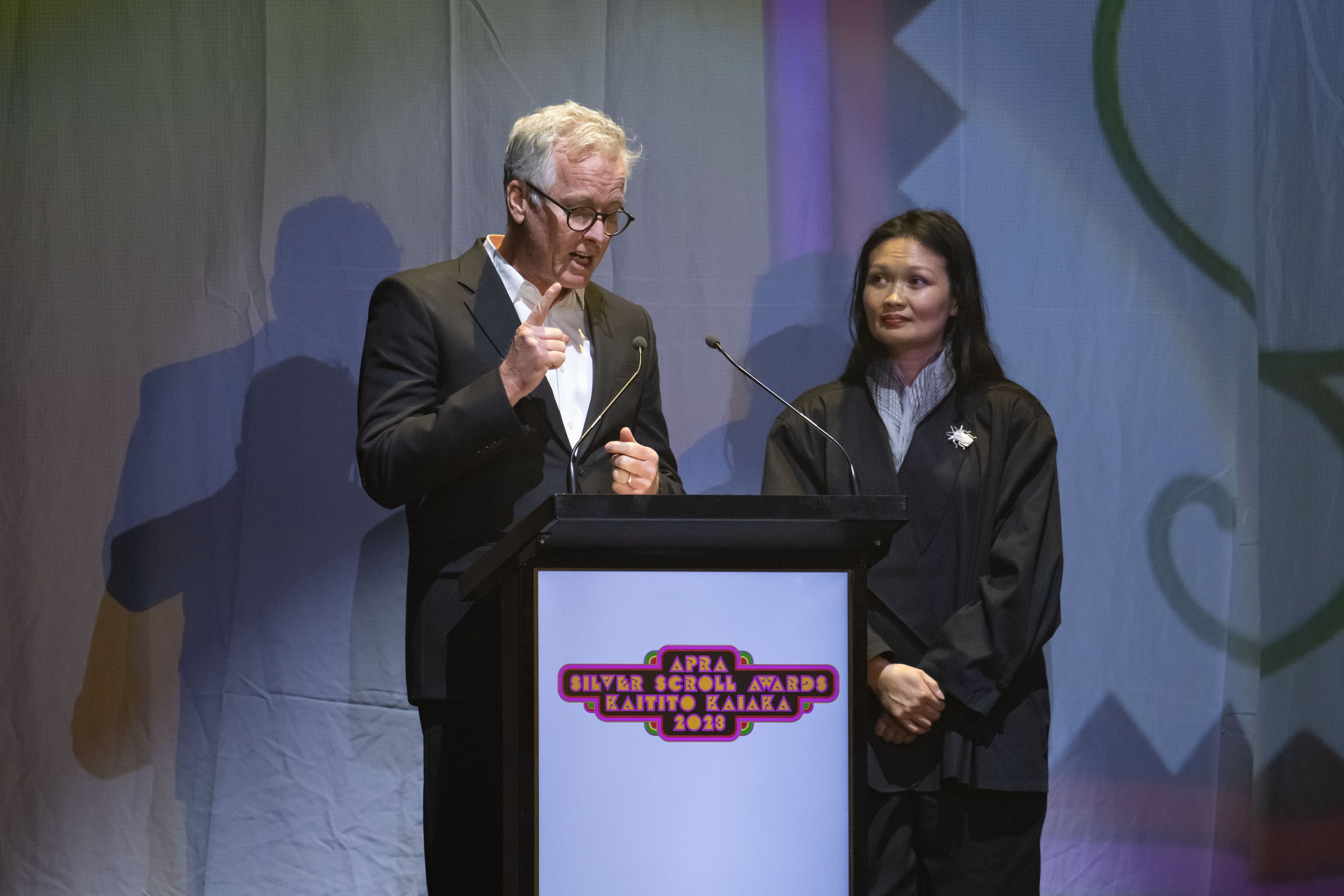Election 2023 - What You Need To Know Before Casting Your Vote
Be informed, be involved - find out where the creative community stands in the eyes of our political parties with their final comments and hear about the issues from sector leaders ahead of deciding which boxes to tick.
Written by

With Election 2023 almost upon us (Saturday 14 October) - there's a huge chance you're feeling political fatigue right now.
Twitter slanging matches, grown men and women shouting over each other on national TV and more polls that you can shake a stick at.
But for the creative community, it's important to stick to issues and know what could lie ahead for the next three years. So The Big Idea has a guide to help you make your choice and help focus on what matters.
There are clearly a huge number issues involved in deciding who should lead Aotearoa for the next three years - but the creative community has every right to be concerned about what the outcome for our sector will be, depending on the outcome of Saturday night (and the Game of Thrones style politics that will follow).
Michael Brook, Head of Strategy at The Big Idea, has spent the last several decades in leadership positions in the creative sector, in roles working closely with local and central government.
"What the last couple of years has proven is the arts, culture and creative sector makes important contributions to the community, to our society - at a grassroots level as well as an economic and professional level," Brook underlines.
"People really need to make an informed vote - check the party policies, check how much each party is valuing our creative sector and what they're saying in terms of how they will support it."
Don't sit on the sidelines

The single most important step - get out and vote.
If you're eligible and don't cast your vote, then you don't get to complain about the outcome.
Don't know where to go? It's 2023, the internet will help you out - like the polling booth location list here - plus all those orange signs and flags around your local schools, halls and churches are usually a dead giveaway...
You can also vote before Saturday if you want - same deal with seeking out those locations.
And if you're not enrolled or unsure on details - check that out too.
Last comment from leading arts politicians
As we have during the election build-up, The Big Idea reached out to the political parties who made up the last three years of parliament for comment - asking if there is any final comments to make to the creative community.

Labour's spokesperson for Arts, Culture and Heritage Carmel Sepuloni (above) told The Big Idea "It has been an absolute privilege to have this role, as Minister for Arts, Culture and Heritage. I’m proud of the mahi our Government has been able to undertake, including helping the sector to recover from the pandemic.
"I wanted to be the Minister for Arts, Culture and Heritage because I love and respect the sector and our artists – I absolutely value all that you contribute. It has been a tough few years and I know that many would’ve have wanted more, my focus had to be on the survival of the sector. I know there is more to do and I hope I get another term to do it."

"Who's ready for the election to be over?" states Chlöe Swarbrick, the Greens spokesperson, adding we'll soon have "an idea of which politicians will have the keys to the piggy bank for our arts, creative communities, and thousands of careers across the country.
"If COVID taught us anything, it’s not only that the “economy” as we know it is made up, it’s that we have the resources to ensure our creative communities flourish. It’s political decisions that see you not have access to predictable funding, to a living wage, to secure housing and to opportunity and sustainability in your field.
"Where other parties have not even written an arts policy, or are tinkering around the edges, the Greens are committed to fighting for you. Our Income Guarantee means you will always have an income between the contracts and gigs, our Pledge to Renters will cap rent increases and protect your rights, and we will develop a long-term, cross-partisan national strategy for our arts and creative sectors. That’s the certainty, funding, and support we all deserve.
"In my home and community of Auckland Central, I’ve had the privilege of organising alongside the likes of Te Taumata Toi-a-Iwi and D.A.M.N. to soften austere Council budget proposals, worked creatively and tirelessly to save the St James Theatre and ensured COVID supports were extended. When we mobilise, we win. So we best keep mobilising.
"Democracy only works for all of us if all of us use our power to shape it. Politics belongs to those who turn up - and whānau, we best turn it all the way up for the arts."
National's spokesperson for Arts, Culture and Heritage Simon O'Connor underlines "National looks forward to continuing its engagement with the sector and building policy together if we are successful at the election."
What are the arts, culture and creativity policies?
Great question, one that's been asked on multiple occasions during the year with very little to hang your hat on. But these are links and stories worth reading if you want more background and context.
Here at The Big Idea, we published an open letter from respected arts advocates back in March, calling for the creative community to be considered in all policy making. We then approached all the parties in parliament and got their response.
Frustrated by the lack of action, another wero was laid by the Arts Lobby Group through The Big Idea in July, which led to the first policy indications for this year's election from the major parties.
Momentum has been gathering with media outlets in recent weeks, with The Spinoff covering the sole arts debate earlier this month where policy was sparse and RNZ's Culture 101 discussing arts and politics in their Carcass conversations.

The sector itself has been proactive this election.
Creative industries advocates WeCreate launched a digital manifesto in September, calling for a new ministerial position – Minister for the Creative and Cultural Economy – with a mandate to work across government and link up policy and action relating to the sector. That has been followed up this week with a domcument sent to key politicians and government officials, with the intent to get the request in front of decision makers before whoever wins starts to consider their cabinet.
With stats like the NZ Creative sector is generating $15 billion in GDP (more than agriculture, according to WeCreate's stats), it's an argument hopefully worth considering.
But there are far less flattering figures that need to be addressed as well - like the $19,500 creative professionals’ median income (compared to the median of $61,800 for salary and wage earners) in the recent CNZ research.
That's among the issues covered off in the Arts Action Now! website, put together by Te Taumata Toi-a-Iwi and the Regional Arts Network Aotearoa (RANA) in a push for an arts, culture and creativity strategy that has plenty of other information to take into account before you vote.
Creative Catalyst Jane Yonge says there's been a lot of interest in the site, also acknowledging the work being done by Arts Makers Aotearoa and D.A.M.N.
"Whichever way the election goes, Te Taumata will be supporting RANA in a post-election call to the incoming Minister for Arts, Culture and Heritage for a comprehensive strategy to support the development of the sector across the motu. Continued community collaboration and collective action will be even more important post-election. We want to see this portfolio as a priority for the next Government.
"The input we’ve had from two ArtsActionNow! online sector wānanga into what people are looking for in a strategy will help inform what we take to the Minister. And there are already good models to draw on for an ambitious strategy – starting with the four we profiled on the hub - Ireland, Australia, the UAE and South Korea."
The New Zealand Writers Guild's most recent newsletter put some questions to political parties to help flesh out issues that pertain to the screenwriting sector - the key one; What are your party’s Arts, Culture and Heritage and Broadcasting policies?
Here are their full responses in alphabetical order.
ACT
Government arts funding, especially from Creative NZ, has become ideological. It has scrapped funding for community Shakespeare because it wasn’t “relevant for a decolonising Aotearoa in the 2020s and beyond.” But Creative NZ funded a show that extolled the murder of James Cook and hunting “white men” with pig hunting knives. An ACT coalition will direct Creative NZ that no funding shall go to activities that are (Editor note: In ACT's opinion) racist and/or promote violence. Creative NZ will be directed that it is investing in the arts for all New Zealanders, including Asian culture, and especially New Zealanders in disadvantaged communities (such as the Otara Sistema programme, which brings music to disadvantaged kids) and rural areas.
ACT will consider selling off up to 50% of TVNZ under the Mixed Ownership Model (MOM). This will lessen the perception that state media is controlled by Government, and bring in investment and commercial accountability, so improving their long-term sustainability.
Greens
The Green Party will ensure better working conditions, more certainty, and greater opportunities for Aotearoa’s artists and creatives. Arts, culture, and creativity is vital for healthy, vibrant people and communities. Like other community infrastructure, the arts, culture, and heritage need proper support. The Green party will:
- Ensure all publicly funded projects pay at least the living wage to artists and expand paid artist residencies including Whiria te Tangata.
Support and invest in repatriating taonga currently overseas, back to iwi, hapū, and whānau Māori. - Provide stable funding for cultural and creative organisations and events both nationally and regionally, including long-term funding commitments for significant creative initiatives such as Te Matatini the New Zealand Symphony Orchestra.
- Ensure that there are a range of creative education and training opportunities to support and expand the local creative sector.
Fund alcohol-free venues, and replace arts funding from gambling revenue with stable, increased investment indexed to inflation. - Support increased funding for quality, non-commercial public media that nurtures and promotes our talent and creativity as a nation, reflecting the unique social and cultural diversity of Aotearoa.
- Increase resourcing for student, community Māori, and Pasifika media and radio.
Labour
Our stories and history are unique. Labour understands the contribution that our artists make to New Zealand. That is why while in Government we made the biggest single investment in the arts, culture and heritage sector in New Zealand’s history through introducing things like the Creative Careers pilot to help people in the creative sector develop non-creative skills and the knowledge required to build financial sustainability.
We introduced an artists resale royalty scheme to ensure that visual artists receive a five per cent royalty payment on the resale of their original works. Labour proudly delivered on our commitment to establish a public holiday, now firmly part of our national identity, to celebrate Matariki. Labour in government will continue to fund events and celebrations which help all New Zealanders enjoy Matariki, fostering connection, exploration of te ao Māori and respect for Matariki mātauranga.
A re-elected Labour government will:
- Build on the success of the Creative Careers pilot and New Zealand Music Commission internships funded through the Cultural Sector Capability Fund by investing in a permanent programme to support New Zealand artists to have sustainable and rewarding careers.
- Deliver the Erebus memorial, Te Paerangi Ataata- Sky Song. We will leverage the existing detailed design work underpinning this kaupapa and find a new enduring location to commemorate Erebus despite recent weather-related setbacks.
- We will also deliver the St James refurbishment by making good on our $15 million commitment to help repair the historically significant St James Theatre.
- Continue to fund Te Matatini, recognising it for the taonga it is.
- Explore ways to continue the Mātauranga Māori Te Awe Kōtuku programme, which supports iwi, hāpū, whānau and Māori communities to maintain and share their precious and vulnerable mātauranga and taonga.
- Bring together the significant work under way in the arts and culture sector including toi Māori and Pacific arts through the Aotearoa Arts Strategy.
We will legislate to ensure that large multinational digital platforms pay a fair price to New Zealand media companies for the local news content they host and share on their platforms, and continue to support our existing public media entities to ensure there is high- quality local content – about New Zealanders, made by New Zealanders. This includes ensuring Māori broadcasting content in Te Reo Māori and also Māori broadcasting content in English. We are committed to public media broadcasting that does not just reflect the indigenous voice but also other minorities and our disabled communities.
National
National believes in an independent and strong media landscape. A country where our arts, media and digital successes are celebrated and retained.
Of the other questions posed by the NZWG, some of the key points include:
ACT
- declared NZ On Air will be directed that its $184 million a year must be for specific NZ content in radio and TV programmes, stating it will not continue the Public Interest Journalist fund.
- will scrap the New Zealand Screen Production Grant (the only party with a desire to do so), stating the best way of attracting investment in the film industry and productions is to remove barriers to investment and production in New Zealand.
- has no policies regarding copyright legislation or promoting intellectual property for the screen industry.
- does not believe that special subsidies or privileges for a preferred industry is in the interests of either the wider NZ economy or the long-term interests of the industry itself.
Greens
- reiterated their desire for stable and long-term funding for arts, local content, film, and culture, including replacing arts funding from gambling revenue with increased investment indexed to inflation. Labour reaffirmed their support for the NZ Screen Rebate.
- pointed out as the only party in Parliament that voted against the CPTPPA (Transpacific Partnership Agreement). they believes artists’ intellectual property and copyright must be protected.
- would promote job security and workplace protections for screen industry workers by removing the ‘Hobbit Law’ which mandates that screen industry workers must be contractors.
- Plans to work with arts and creative communities to develop a national strategy for the future of arts and culture in Aotearoa, with a plan for long-term investment and development of our arts sector. Such a strategy could also inform arts education and sustainable career pathways, and facilitate local, philanthropic, and corporate investment to where it will have the most impact.
Labour
- will continue to invest directly in our cultural entities like Creative New Zealand, the New Zealand Symphony Orchestra, the Auckland Philharmonia, the Royal New Zealand Ballet, Te Matatini, Te Papa, the New Zealand Film Commission, Nga Taonga / New Zealand Film Archive, and in other organisations across the arts.
- will keep the New Zealand Screen Production Rebate in place and have no current plans to remove it or increase it.
- Given the last significant review of the Copyright Act was completed more than a decade ago, Labour believes NZ's copyright regime must be robust enough and flexible enough to deal with the challenges of technological advances.
- believe in a well-supported public media environment to ensure that New Zealand’s stories are told.
National
- states they will support protection of intellectual property while ensuring the purpose is to protect the IP whilst making it available in a controlled manner.
- doesn't support the Screen Industry Workers Act (SIWA) believing it will create a less flexible labour market and strengthen union power beyond what is appropriate, lead to less investment, slow the economy, and lead to fewer jobs within the film industry.
- acknowledges the work of the Media Sector as an integral part of the cultural landscape of New Zealand.
- Non-commital to increases for screen funding bodies and state they're open to discussing vocational education pathways with the sector.
Last word from the sector
The most consistent, independent voice of artists, creative practitioners and academics has been the Arts Lobby Group - made up of Sir Roger Hall, Judy Darragh, John Daly-People, Eve de Castro-Robinson, Peter O’Connor and Roger Horrocks - with contributions from Victoria Kelly and Jennifer Ward-Lealand.
Horrocks told The Big Idea "Our lobby group did its best to persuade our country’s political parties to offer an exciting new arts policy. It is urgently needed when almost all the experienced artists view the situation for the arts as gruelling and frequently discouraging. We also pointed to the impressive new forms of support for the arts that the Albanese government has introduced since winning the Australian federal election last year.
"But as Steve Braunias remarked the other day in Newsroom, 'The opportunity has withered on the vine.'
"Policies have been fired off in every other direction. But the only one of our local political parties to come out with anything resembling an arts policy has been the Greens.
"We know we are not the only members of the local arts community to be dismayed by this lack of interest, since it was a hot topic of discussion among the music community who attended last week's Silver Scrolls Awards at Spark Arena.

"When Anthony Healey, the NZ head of APRA-AMCOS, opened the event, he pointed out Swarbrick was the only MP to not only RSVP but to show up. 'We invited everyone, well almost everyone, but judging by the lack of response - or any really visionary arts, cultural or music policies from most of the parties - we are clearly not a priority this time.' Healey went on to congratulate the Greens for being the only party with a published policy on arts and culture. The audience responded strongly to his comments.
"When Victoria Kelly won the 2023 Sounz Contemporary Award for her work Requiem, she used her speech to call on politicians to pay more attention to the arts. She had passionate things to say about the value of the arts and their importance in education. Victoria also received a huge response from the audience. One of the major points in our lobby campaign has been the short-sighted way in which arts education has been downsized, at every level from primary to tertiary.
"Well, the election opportunity is about to pass, but there will continue to be an important role for everyone who cares about the arts to communicate with the incoming Minister for the Arts, in the hope that somehow we can get past the usual platitudes and convey the urgent need for some practical plans."